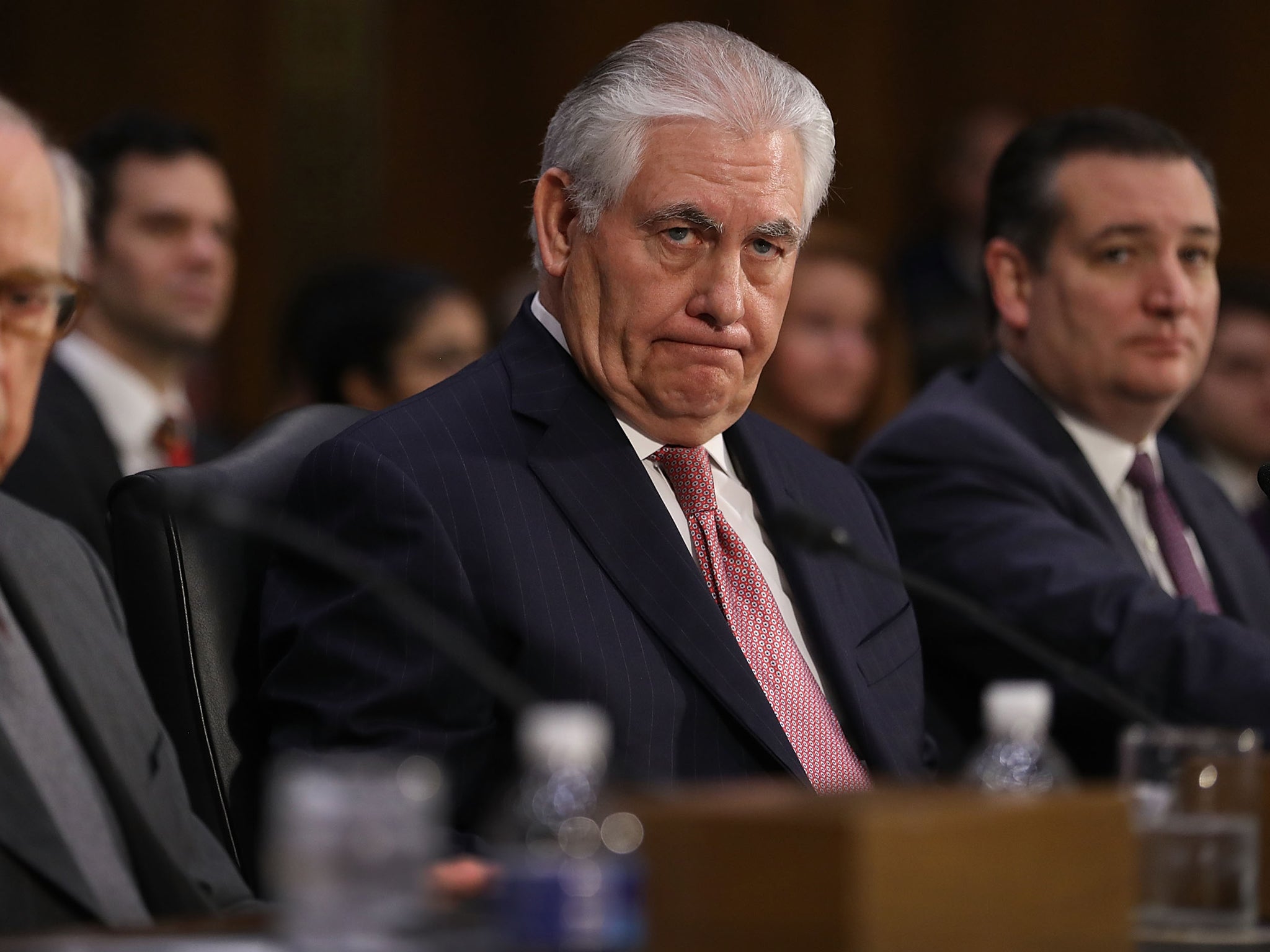Secretary of State nominee Rex Tillerson diverges from Donald Trump's stance on Russian sanctions and climate change
The former ExxonMobil CEO said he supports Obama’s actions against the Kremlin following hacking report, admits climate change is real

Your support helps us to tell the story
From reproductive rights to climate change to Big Tech, The Independent is on the ground when the story is developing. Whether it's investigating the financials of Elon Musk's pro-Trump PAC or producing our latest documentary, 'The A Word', which shines a light on the American women fighting for reproductive rights, we know how important it is to parse out the facts from the messaging.
At such a critical moment in US history, we need reporters on the ground. Your donation allows us to keep sending journalists to speak to both sides of the story.
The Independent is trusted by Americans across the entire political spectrum. And unlike many other quality news outlets, we choose not to lock Americans out of our reporting and analysis with paywalls. We believe quality journalism should be available to everyone, paid for by those who can afford it.
Your support makes all the difference.Donald Trump’s nominee for Secretary of State appeared to disagree on some issues with the President-elect when he testified before the Senate Foreign Relations Committee.
Rex Tillerson said he supported current US sanctions against Russia after hearing the revelations about alleged attempts by the Kremlin to interfere with the 2016 presidential election.
While Mr Trump has reluctantly conceded that Russian operatives may have been behind the hacks of the Democratic National Committee, he has insisted that they in no way had an effect on the outcome of the election.
But the CIA, FBI, and NSA – the agencies behind the highly classified report delivered to both Mr Obama and Mr Trump – did not reach that conclusion, as they could not measure how information obtained through the hacks influenced public opinion.
Mr Tillerson was speaking on the second day of confirmation hearings for Mr Trump’s Cabinet picks, which still need congressional approval.
He did not mention the conclusions reached by the intelligence community in his opening statement, but when questioned by Senator Marco Rubio, Mr Trump’s former rival for the Republican presidential nomination, he said he found the findings “clearly troubling”.
He also admitted that it was a “fair assumption” that President Vladimir Putin directed the cyber attack.
The former ExxonMobil chief executive has conducted extensive business with the Russian President, causing concern among critics of the incoming Trump administration, that already faces scrutiny for their relationship with the country.
In 2011, Mr Tillerson negotiated an energy partnership with Russia that Mr Putin valued at approximately $500bn (£409bn). The partnership resulted in Mr Tillerson receiving the Order of Friendship, Russia’s highest honour awarded to foreign nationals.
But ExxonMobil had to cease operations in the region in 2014, after US sanctions resulted from the illegal annexation of Crimea – which Mr Tillerson opposed at the time. The head of the oil giant’s Russian operations, Glenn Waller, said the company would return to the project once sanctions had been lifted.
Mr Tillerson said there should have been a military response to Russia in 2014, and their aggression toward the Ukraine resulted from an “absence of American leadership”.
“I’m advocating for responses that will deter and prevent further expansion of a bad actor’s behaviour,” he said.
“Sanctions are a powerful tool, and they’re an important tool.”
But he stopped short of being overtly critical of Vladimir Putin – especially when it came to his actions in Syria – and refused to call him a war criminal.
“I would not use that term,” he said. “Those are very, very serious charges to make and I would want to have much more information before reaching a conclusion.”
Mr Rubio responded: “There’s so much information out there. It should not be hard to say that Vladimir Putin’s military has conducted war crimes in Aleppo.”
The Florida senator and former presidential candidate could throw a wrench in the President-elect's plan to place the oil executive in the highest foreign policy position in the US.
Should Mr Rubio decide to vote against Mr Tillerson, then the committee would deliver an unfavourable report to the Senate.
Only three Republican Senators, then, would need to break with the party and vote against Mr Tillerson to reject his nomination.
"I'm prepared to do what's right," Mr Rubio told reporters after the hearing, declining to give a definitive answer regarding his decision.
On the issue of climate change – a matter that the Obama administration has worked to tackle, resulting in a global agreement to slash carbon dioxide emissions – Mr Tillerson diverged from Mr Trump’s denial of the phenomenon and admitted that it existed. But he wrote off his company’s role in spreading disinformation to undermine the science behind global warming.
“The risk of climate change does exist, and the consequences could be serious enough that action should be taken,” he said. “Our ability to predict that effect is very limited [and the action nations should take] seems to be the largest area of debate existing in the public discourse.”
But when asked about the role of ExxonMobil throughout his 41 year career with the company, he dismissed the question.
Documents published by Inside Climate News, a Pulitzer Prize-winning nonprofit, indicate that Exxon knew about the impact of fossil fuels on the environment as early as 1982.
“Since I’m no longer with ExxonMobil, I can’t speak on their behalf,” Mr Tillerson said. “The question would have to be put on ExxonMobil.”